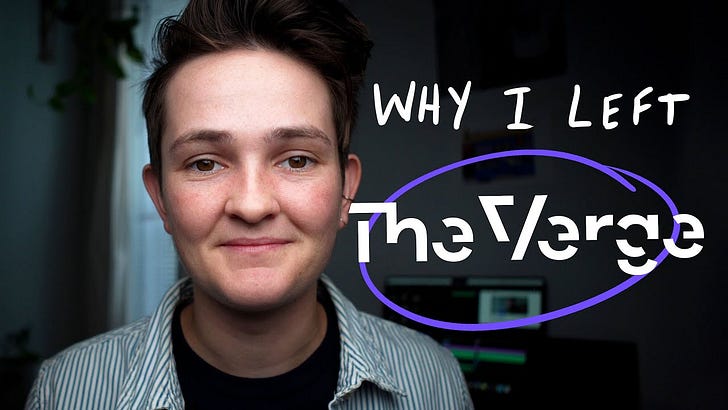Becca Farsace on why she's leaving The Verge
As another video creator goes solo, do media companies need to rewrite their own rules?
In a powerful video posted to her YouTube channel Wednesday, Emmy Award-winning videographer Becca Farsace lays out the case for why she loved creating YouTube videos for The Verge, but ultimately had to leave. Farsace is the latest in a stream of Vox Media video talents going solo, following exits from Joss Fong, Cleo Abram and Johnny Harris.
For Farsace, it comes down to ownership, freedom and the right to self-determination. Watch the video for Becca’s compelling and clear distillation of the reasons so many talented creators are stepping away from media companies to strike out on their own.
A few notable quotes:
Farsace talks about the reaction after she launched her own YouTube channel during Covid: “As soon as I posted that video I got pulled into a meeting at The Verge and I was told that at any point in time they could make me take down any videos they wanted and that I shouldn't even be sure that I owned anything that was on any of my social media channels … “every time I posted a video I lived in fear of being called into a meeting and being told that I couldn't do that and in a weird way it made me feel like The Verge owned me.”
On her award-winning body of work at The Verge: “Everything I made for The Verge is theirs and I’m taking nothing with me. I owned nothing … That’s really tough to leave behind. So I’m really excited to build something that’s mine.”
On the primacy of web content (this is an important one to note as most media brands are still built on a business model that prioritizes website traffic and views. It’s part of why many traditional media companies have had trouble monetizing video while brands are cutting big $$$ deals with influencers): “It’s a website. It’s full of the written word and I’m not a writer. At the Verge I had to make the video and write the paper … No matter how long I was there, I was never gonna get the big written reviews. Because again I don’t write. So I knew whenever big products came out, there would be someone in front of me.”
Verge EIC Nilay Patel took to Threads to share his best wishes for Becca’s next step and gives The Verge (deserved) credit for growing talents like Becca.
It’s worth pointing out that The Verge didn’t do anything extraordinarily restrictive in the grand scheme of how media companies work. Employment contracts often include boiler plate language about the company’s ultimate ownership of any IP created while employed at the company or using the company’s equipment. It’s standard for writers, photographers, videographers, graphic designers – pretty much everyone – to cede 100 percent of that ownership to the company. What the trend in video makers leaving brands to be in control of their content, and their destiny, tells us, though, is that media companies may need to rethink their willingness to share ownership, and profits, with the highly creative content producers like Becca Farsace for whom the old rules just aren’t good enough anymore.




